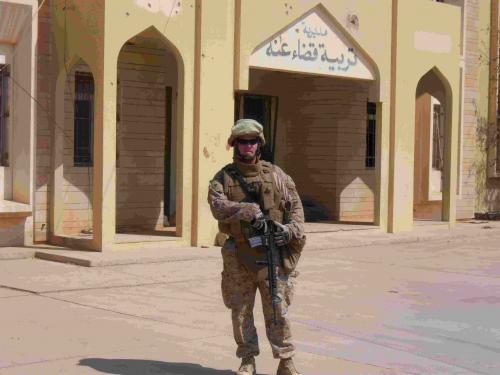
Tell me about your current role at Yale University?
Currently I am an Operations Manager in the medical school, managing the business office for the Division of Substance Abuse. Additionally I’m one of the co-chairs of the YVN and proud to support the universities efforts to become an employer of choice for veterans and their families.
Would you share some of your military experience and transition to the private sector?
I enlisted in the United States Marine Corps in 2005 and completed my service in 2010 as a sergeant. My MOS (military specialty) was finance; in the US I rotated through a few different functions but while in Iraq most of my work was executing various types of payments, from reconstruction projects to intel payments and everything in between.
When transitioning out of the Corps I faced a similar challenge to most veterans; how to transition my military skills to the civilian workforce. Immediately I worked on completing my undergraduate degree and began working here at Yale as a financial assistant. Which brought on the challenge of a cultural transition to an institution much different from the military.
How does your military experience impact your position at Yale?
Luckily my finance experience was a fairly close match to Yale’s needs, with large portions of research funds coming from the federal government. Additionally as a Sergeant of Marines I had supervisory and management training that is applicable almost anywhere. This along with having a supervisor that was a veteran herself enabled me to quickly move into my current role and drive change throughout my unit.
Could you discuss some of the intangible skills that veterans like yourself bring to an organization?
Most veterans bring a bias for action and comfort with change that I believe greatly benefit an organization. Sometimes this can be challenging for established institutions to incorporate, but the diversity of thought and experience ensures balance between robust debate and initiating action. Or as I have been told before “Vets get stuff done!”
What advice would you provide to a Veteran who is transitioning into the Civilian work and seeking employment?
·Translate your resume. I have seen some vets fill their resumes with acronyms to describe what they have accomplished, I may understand this but other hiring managers will not.
·Don’t be afraid to highlight what you have accomplished, often we frame things in terms of unit/team/group but you should confidently discuss what you have accomplished.
·Use your network, I have not yet met a veteran to push me away. We want to help, we have been there too. Pick up the phone and call a veteran, a service organization (VFW, IAVA, American Legion…) they can and will connect you with folks to guide you in the transition.
·USE YOUR GI BILL BENEFITS!
What do you think about the Yale Veterans Network?
YVN is a great start and true indication of how Yale values vets. We would all like to see more involvement from our fellow veterans, come to a meeting, get to know us. We are connected to the alumni, students and ROTC groups; and exciting things to come! I wish the Yale YVN the greatest success possible and will continue to support the group from afar.
Additional Questions:
What is your undergraduate degree in and where did you get it?
Business Management at University of New Haven in October 2012. Finished MBA at Indiana University in February 2015.
Can you tell me more about your cultural transition to Yale?
My cultural transition to Yale involved going from an organization where decisions were made immediately and consequences for those decisions are very high, versus the discussion. Also, there is a different type of diversity at Yale: 80/20 or 85/15 male/female ratio. It’s a very interesting change to see in a good way because you’re moving from something much more regimented where things are defined for you. You drive your own bus in the civilian world. In the military, you are a passenger on that bus.
How has your supervisor supported you at Yale?
My supervisor, who retired last spring in April, saw and understood my experience as an Air Force Vet. She encouraged me to to step up in the vacant role, showed confidence that I could fill the role and gave leeway to initiate change.
How have you been able to drive change throughout your unit?
I tried to build consensus when possible and pushed through resistance. I was able to move the unit mostly paperless. I also played a role in creating a culture of willingness and thoughtful change, and valuing ideas that could improve.
How has your experience been as the YVN Co-Chair?
My experience as the YVN Co-Chair has been a very interesting. I have gotten to see how a completely different side of the university works, and made a great connection with the other affinity group leaders that have guided some thought and direction. Having the group shows a commitment from the university for veterans, and gives Yale an opportunity to be a leader.
Do you have any final thoughts as you are preparing to transition out of Yale?
Take the good of where you are right now at Yale and don’t be afraid to incorporate your prior experience that has made you successful in the past.